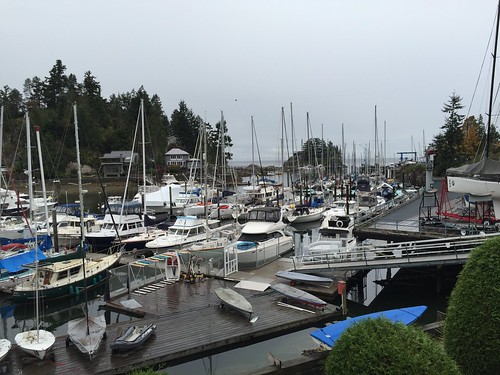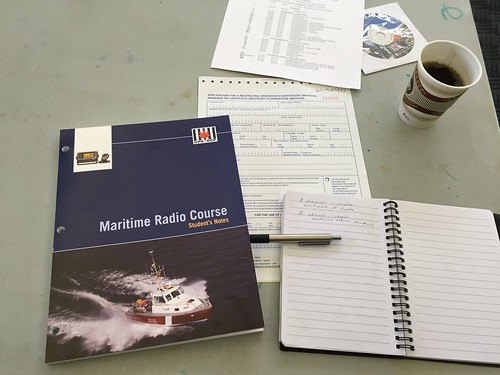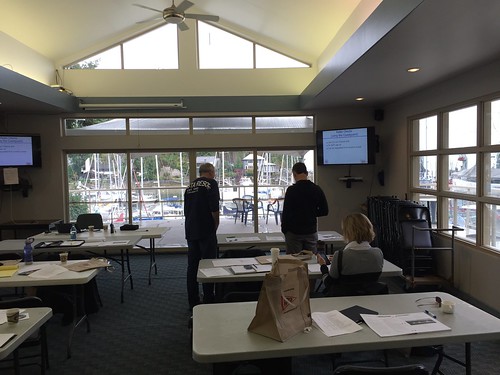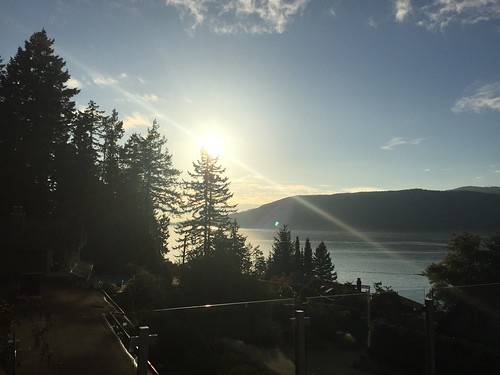One thing I realized this summer while sailing the Gulf Islands on my boat Liberty, was that I had no idea how to operate my radio. I was able to listen to conversations on channels, but I had no idea what channels to listen to nor how to initiate a conversation myself. So when I was back I did some research and found I actually needed to be licensed in order to operate my yacht’s radio.
The easiest way to get certified was through a one-day course, which is offered a few times a year at the West Vancouver Yacht Club. Today was one of those days, so at 8:45 AM I showed up in their classroom overlooking the marina. It turned out to be a rainy day today, so it was perfect for spending it inside and learning a lot. I had not prepared much, except for revisiting the phonetic alphabet (Alpha, Beta, Charlie, Delta etc.) and some common abbreviations.
There were 11 students for today’s course, most of them experienced sailors and several of them with prior radio experience. Alll students received a book that would be the basis for the exam at the end of the day. We could have picked up book at the instructor’s house a couple of days before the course, but I had been too busy at work to study, so I hadn’t done so. During the first 30 minutes of the course I regretted that, because the level was a bit higher than I had expected, especially when listening to the questions that some of the students asked and that I did not even understand.
But after a few hours of listening intently and taking tens of pages of notes everything came together and I felt I understand most of the theory. It’s really not that hard, but if you don’t even know the difference between a traditiona VHF radio and a DSC (digital selective calling) device it is a bit overwhelming at first.
The course was very interesting actually and I enjoyed taking part in it. Everyone who has a boat with radio (most boats these days have one) should probably participate, not only because it’s obligatory and will make you a better sailor, but also because you learn a lot of interesting facts (did you know that almost anything you hear over the radio should be treated confidentially? You can’t just blog about it for example…).
After doing theory until about 1:30 PM we started on the practical (oral) part. We similated several situations in which we needed to communicate with other ships or with the coast guard. Very useful, because if you need to do this for the first time on your own boat it can be quite stressful. Now you could make mistakes without all other boats around you listening in.
A class room with a view!
The day ended with a 1-hour theory exam which was not very hard (it was multiple choice!), I finished it in 20 minutes or so and passed easily. The oral exam that followed was quite easy as well, I had to use the phonetic alphabet to spell some words and boat IDs, and then I had to do a simulated radio call in a security situation. Also this I could do without many problems and now I’m the holder of a restricted maritime radio operator’s certificate.
Looking back it’s interesting how much you can learn in one day if you fully focus on it. This morning I still did not know much about radio communication and now I know quite a lot about radio channels, protocols and equipment. I look forward to using my maritime radio for the first time to talk to the coast guard and I may actually take one of my boat’s handheld radio sets home to listen in to some of the maritime conversations that take place on the ships that pass by our house.
When I got home the rain stopped, the sun broke through the clouds and the sky was almost blue. I love Vancouver’s weather!



